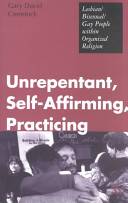Unrepentant, Self-Affirming, Practicing
Gary David Comstock
First defining and then employing an epistemological strategy of ‘situated knowledges,’ in which people pool their experiences of a particular phenomenon and then critique each other’s observations to build a knowledge base about it, Comstock expands the knowledge claims for his research on mainline Christian lesbigays by comparing his findings with 26 other empirical studies on lesbigays in religious organizations – which range from evangelical Christian, Native American, and Roman Catholic to Jewish and Mormon – as well as with 10 additional studies of lesbigays that paid some attention to religious factors. The result is a carefully crafted research conversation about lesbigay experiences in several of the major Christian denominations in the United States.
Comstock deftly depicts both the pervasive involvement of lesbigays in organized religion and the antigay sentiment that typically confronts them. In one of his more arresting findings, he demonstrates how geography and the level of public outness are more directly associated with the form and intensity of institutional antigay sentiment than is institutional policy. Comstock also reports that lesbigays involved in traditional religious institutions experience a common need for tactics to address or avoid the anti-gay strains of their faith. This finding is not itself new; but by employing his epistemological strategy to analyze the various studies that have documented this experience, Comstock make an intriguing claim. He argues that lesbigays across a variety of religious traditions are distancing themselves from the particularities of their individual religious organizations to articulate a religious faith that has many common characteristics.
Comstock identifies this multiply rooted religious expression as an emergent lesbigay theology. Simultaneously prophetic and inclusive, this new theology possesses such key traits as taking personal experience and relationships seriously as a resource for ordering one’s life; accepting and loving oneself and others as physical, sexual, and affectionate beings; realizing that homophobia, not homosexuality, is a problem; accepting and valuing human differences; and sharing a commitment to building inclusive communities of equals. Comstock argues that the last two traits – the valuing of human differences and the commitment to inclusiveness – may be values especially honored by traditionally religious lesbigays because of their ongoing dedication to developing communities with people unlike themselves. The weaknesses of the book are few, and not all are attributable to Comstock.
One notable problem is the apparently small number of lesbigays studied in the 26 studies that comprise the chief data source for this portrait. In three of the investigations it is unclear how many persons were involved; but the remaining 23 included only 2,260 people. Further, the primary studies of lesbigay experience that Comstock cites were carried out as early as 1976 and as late as 1994. To construct generalizations about a large and diverse population based on a fairly small number of people studied by 26 different researchers or research teams across an 18- year time span may be asking more of situated knowledges than it can deliver. There are also some problems with Comstock’s claim to be using a situated-knowledges approach. As an epistemological strategy that simultaneously privileges and critiques individual experience, situated knowledges is a valuable, albeit under used, research theory. However, this book does not fully exploit its potential. Comstock does not present the reader with a communal effort by lesbigays to speak about their own experiences and then critique each other. Instead, his work is one researcher’s attempt to allow the responses that lesbigays have given to a variety of researchers’ questions to interrogate each other.
It remains unknown whether religious lesbigays deemed the questions they answered as important or marginal for addressing the nature of their faith. Comstock also leaves unaddressed how lesbigays respond to his overview of the many research findings. Yet the most intriguing part of the book comes when Comstock does use a situated-knowledges strategy to draw his conclusions about lesbigay religiosity and to present the reader with a preliminary outline of an emergent lesbigay theology. With its succinct, accessible language and rich collection of empirical research findings on lesbigay peoples, Unrepentant, Self-Affirming, Practicing would be an excellent addition to academic libraries and could be appropriately used as well in an undergraduate religion or sociology classroom. ~ Brenda E. Brasher, Journal for the Scientific Study of Religion, Vol. 36, No. 3 (Sep., 1997)
Check for it on:
Details
| ISBN | 9780826414298 |
| Genre | Religion & Spirituality; LGBT Studies/Social Sciences |
| Publication Date | 14-Jun-02 |
| Publisher | Continuum International Publishing Group |
| Format | Trade Paperback |
| No. of Pages | 350 |
| Language | English |
| Rating | NotRated |
| Subject | Religion / Christian Life / Social Issues; Social Science / Gay Studies; SOCIAL SCIENCE / General; Social Science / Sociology Of Religion |
| BookID | 13937 |
